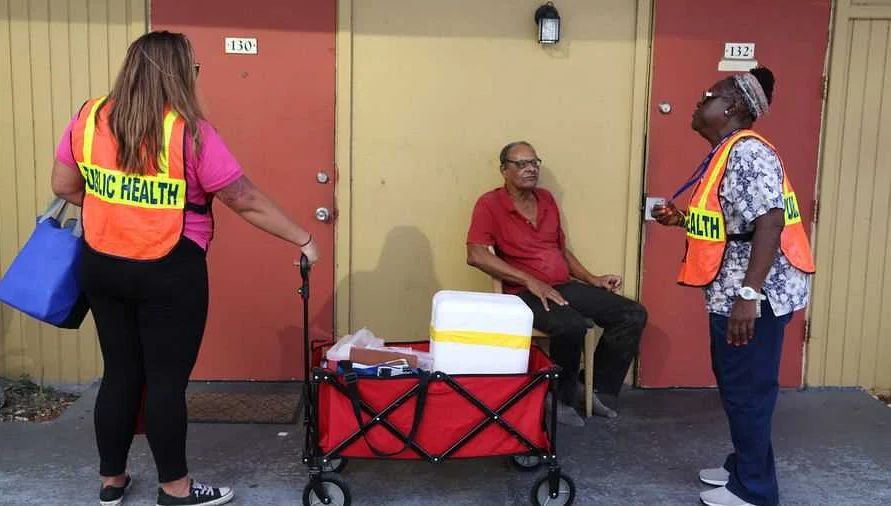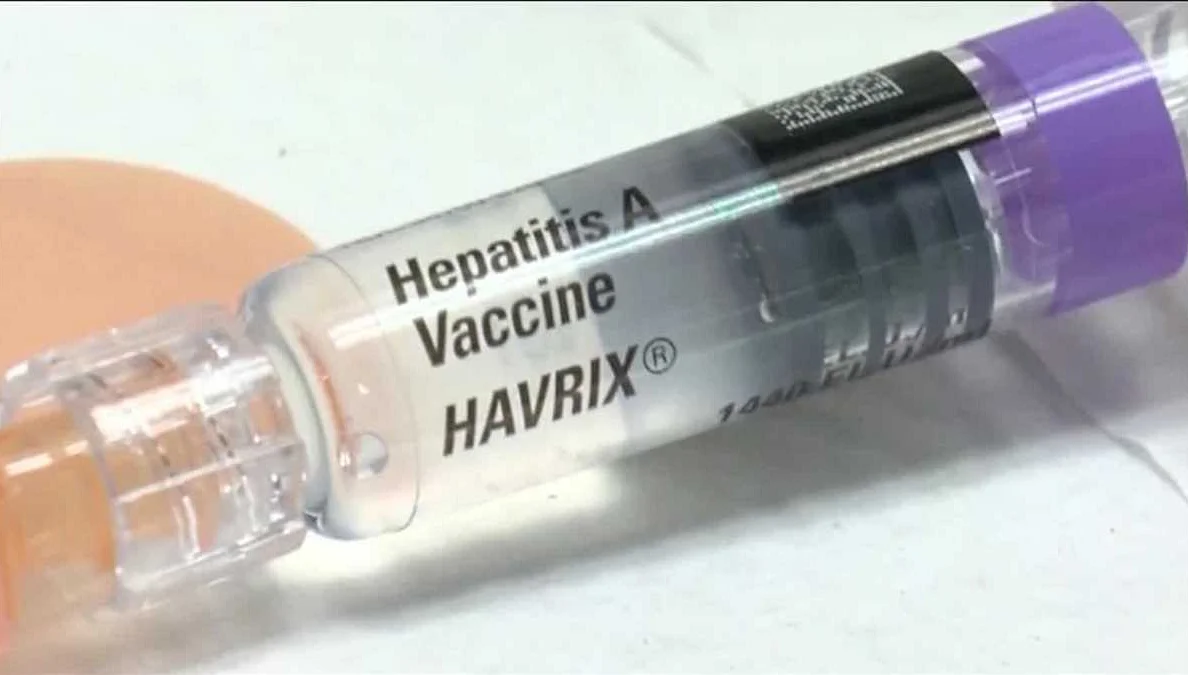St. Petersburg residents urged to get vaccinated against hepatitis A: the season of intestinal infections has begun
St. Petersburg residents are encouraged to protect themselves against hepatitis A by getting vaccinated as the season of intestinal infections has started. Learn more about the importance of vaccination and how to stay safe from this potentially serious virus.
Hepatitis A is a highly contagious liver infection that can cause mild to severe illness. It spreads through close personal contact with an infected person or by consuming contaminated food or water. In an effort to prevent the spread of this potentially dangerous virus, the city of St. Petersburg is urging its residents to get vaccinated.
The vaccine for hepatitis A is safe, effective, and readily available. It is recommended for all children over the age of one and for adults who are at higher risk of infection, such as healthcare workers, travelers to countries with high rates of hepatitis A, and people with chronic liver disease.
Getting vaccinated is the best way to protect yourself and your loved ones from hepatitis A. The vaccine stimulates your body’s immune system to produce antibodies that fight off the virus, providing long-term protection. It is a simple and relatively painless procedure that can save you from the hassle and discomfort of a hepatitis A infection.
St. Petersburg is providing free or low-cost vaccinations to residents at various clinics and healthcare centers throughout the city. It is important to take advantage of these resources and get vaccinated as soon as possible. By doing so, you not only protect yourself but also contribute to the overall health and well-being of the community.
Protect Yourself from Hepatitis A

Hepatitis A is a highly contagious liver infection caused by the hepatitis A virus. It can be spread through contaminated food and water or close contact with an infected person. The best way to protect yourself from hepatitis A is to get vaccinated.
The hepatitis A vaccine is safe and effective. It is recommended for all children at age 1 and for adults who may be at risk, including travelers to countries with high rates of hepatitis A, men who have sex with men, people who use drugs, and people with chronic liver disease.
In St. Petersburg, the city is urging residents to get vaccinated against hepatitis A. The vaccine is available at local clinics and pharmacies. It is also important to practice good hygiene, such as washing hands thoroughly with soap and water, especially before eating or preparing food.
If you think you have been exposed to hepatitis A or are experiencing symptoms such as fever, fatigue, loss of appetite, nausea, vomiting, abdominal pain, dark urine, or jaundice (yellowing of the skin and eyes), it is important to see a healthcare provider right away.
By getting vaccinated and practicing good hygiene, you can protect yourself from hepatitis A and help prevent the spread of the virus to others. Don’t wait, get vaccinated today!
St. Petersburg Urges Residents
St. Petersburg is encouraging all residents to protect themselves from Hepatitis A by getting vaccinated. Hepatitis A is a viral infection that affects the liver and can be spread through contaminated food or water, or through close contact with an infected person.
Vaccination is the most effective way to prevent Hepatitis A, and the city is urging all residents to get vaccinated as soon as possible. The vaccine is safe, highly effective, and widely available. It is especially recommended for individuals who are at higher risk of infection, such as healthcare workers, food handlers, and people who live or work in crowded or unsanitary conditions.
In addition to vaccination, residents are advised to practice good hygiene to reduce their risk of contracting Hepatitis A. This includes washing hands thoroughly with soap and water, especially before preparing or eating food, after using the bathroom, and after changing diapers. It is also important to avoid sharing personal items, such as towels or eating utensils, with an infected person.
The city of St. Petersburg is working to raise awareness about Hepatitis A and the importance of vaccination through public education campaigns and outreach efforts. It is also providing resources and information to healthcare providers to ensure that residents have access to the vaccine.
By taking proactive measures and getting vaccinated, residents of St. Petersburg can protect themselves and their community from the spread of Hepatitis A.
Get Vaccinated to Prevent
Vaccination is the most effective way to prevent hepatitis A infection. By getting vaccinated, you can protect yourself from the virus and reduce the risk of spreading it to others. The hepatitis A vaccine is safe and highly recommended for everyone, especially those who are at a higher risk of contracting the virus.
Here are some key reasons why you should consider getting vaccinated:
- Protection: The hepatitis A vaccine offers long-term protection against the virus. It can prevent you from developing the disease and its associated complications.
- Herd immunity: By getting vaccinated, you contribute to the overall immunity of the community. This helps protect individuals who cannot receive the vaccine, such as infants or individuals with weakened immune systems.
- Travel: If you are planning to travel to areas with high hepatitis A prevalence, vaccination is strongly recommended. This can protect you from contracting the virus in regions with poor sanitation or limited access to clean water.
- Work requirements: Some occupations, such as healthcare or food service workers, may require hepatitis A vaccination as a job requirement. Getting vaccinated can ensure compliance with these regulations.
It is important to note that the hepatitis A vaccine is typically administered in two doses, with the second dose given 6-18 months after the first. Vaccination is a simple and painless procedure that can be done at your healthcare provider’s office or local health department.
Don’t wait until it’s too late. Get vaccinated to protect yourself and those around you from hepatitis A.
The Spread of Hepatitis A
Hepatitis A is a highly contagious liver infection caused by the hepatitis A virus (HAV). It is typically spread when a person ingests food or water that has been contaminated with the feces of an infected person. This can occur through several means:
1. Person-to-person transmission: Hepatitis A can easily spread from person to person, especially in settings with poor sanitation and hygiene practices. This can happen through direct contact with the infected person’s feces, such as by changing diapers or engaging in sexual activities.
2. Consumption of contaminated food or water: Contaminated food or water can carry the hepatitis A virus, especially if it is prepared by someone who has not practiced proper hand hygiene. Consuming raw or undercooked shellfish that have been harvested from contaminated waters can also lead to infection.
3. Travel-related transmission: Traveling to regions with high rates of hepatitis A can increase the risk of infection. This is particularly true in countries with inadequate sanitation systems and poor hygiene practices.
4. Outbreaks in institutions or communities: Hepatitis A outbreaks can occur in institutions such as schools, daycare centers, and healthcare facilities. Close contact and shared facilities can facilitate the spread of the virus in these settings.
It is important to note that practicing good hygiene, such as washing hands with soap and water after using the bathroom and before preparing food, can help prevent the spread of hepatitis A. However, the most effective way to protect against hepatitis A is through vaccination.
What is Hepatitis A?

Hepatitis A is a highly contagious liver infection caused by the hepatitis A virus (HAV). It is usually spread when a person ingests food or water that has been contaminated with the fecal matter of an infected person. Hepatitis A can also be spread through close contact with an infected person, such as household contact or sexual contact.
The symptoms of hepatitis A can range from mild to severe and can include fever, fatigue, loss of appetite, abdominal pain, nausea, and jaundice (yellowing of the skin and eyes). Most people who are infected with hepatitis A will recover without any long-term liver damage, but in rare cases, it can cause acute liver failure and even death.
Fortunately, hepatitis A can be prevented with a safe and effective vaccine. The vaccine is recommended for all children over the age of one and for adults who are at increased risk of infection, including healthcare workers, travelers to areas with high rates of hepatitis A, and men who have sex with men.
| Hepatitis A is a highly contagious liver infection caused by the hepatitis A virus. |
| It is usually spread through contaminated food or water, or close contact with an infected person. |
| Symptoms can range from mild to severe and may include fever, fatigue, loss of appetite, abdominal pain, nausea, and jaundice. |
| Hepatitis A can be prevented with a safe and effective vaccine. |
Why Vaccination is Important
Vaccination plays a crucial role in protecting individuals and communities from infectious diseases like Hepatitis A. Here are some reasons why vaccination is important:
- Prevention of disease: Vaccines are highly effective in preventing the spread of diseases. Hepatitis A, for example, is a highly contagious virus that can cause liver inflammation and lead to serious health complications. Getting vaccinated can significantly reduce the risk of contracting the virus.
- Protecting vulnerable populations: Vaccination not only helps protect individuals who receive the vaccine but also helps protect those who cannot be vaccinated, such as infants, pregnant women, and individuals with weakened immune systems. By getting vaccinated, you contribute to the overall community immunity, also known as herd immunity, which helps protect those who are unable to receive the vaccine.
- Preventing the spread of disease: Vaccines work by stimulating the immune system to recognize and fight off specific diseases. When a significant number of individuals in a community are vaccinated, the spread of the disease is limited, helping to prevent outbreaks and epidemics.
- Cost-effective: Vaccinations are a cost-effective way to prevent diseases. The cost of vaccination is typically far lower than the cost of treating the disease and its complications. By getting vaccinated, you not only protect yourself but also help reduce the burden on healthcare systems.
- Global impact: Vaccination is a key tool in global health efforts. By improving vaccination rates, we can reduce the burden of diseases worldwide, prevent epidemics, and save countless lives.
In conclusion, vaccination is an essential step in protecting yourself and others from diseases like Hepatitis A. By getting vaccinated, you contribute to the overall health and well-being of your community.